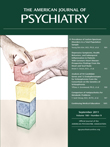Do All Relapses in Schizophrenia Warrant Resumption of Medication?
To the Editor: In the March 2011 issue of the Journal, Subotnik et al. (1) detail the high likelihood of relapse with even small degrees of medication nonadherence in first-episode schizophrenia patients. This study provides clinicians, patients, and their families with important information as they consider treatment decisions.
However, the authors also assert that nonadherence is the “greatest obstacle to recovery and relapse prevention” (emphasis ours). It may seem logically obvious that lack of relapse is a precondition for recovery, but this may not be so. If by recovery we mean functional recovery (e.g., the capacity to work, have meaningful relationships, and have a satisfying life), positive symptoms have less relevance than cognitive and negative symptoms. Antipsychotics do little, if anything, to help these crucial factors, but they do have serious toxicities that increase morbidity and mortality. Their overall impact is such that patients routinely discontinue them (2). One of the great drivers of nonadherence in schizophrenia may be that many patients want recovery rather than a reduction in positive symptoms; psychiatrists who view clinical outcomes primarily as positive symptom control emphasize compliance.
When psychosis worsens, it is standard practice to resume treatment with or increase the dosage of antipsychotics, despite the fact that many “relapses” are mild—either requiring no hospitalization (3) or otherwise lacking clinical significance (4). While clearly the mildness of these relapses may be attributable to the rapid resumption of medication, there may be a subgroup of patients who could weather increased positive symptoms, or perhaps even learn from them, without resuming medication, as can occur in relapses during addiction recovery. In current practice, the option of not resuming medication is rarely considered or offered, and patients can become trapped in the mental health system—both by their disease and by their treatment. Small wonder that so many try to “break away” through nonadherence.
Importantly, we believe, some succeed. Some patients achieve substantial recovery without antipsychotic medication, sometimes by finding ways to work around their positive symptoms. Empowerment, often attained through work, family, or community, is a crucial ingredient (5). However, our general failure to seriously engage in shared decision making by helping patients make informed choices impedes empowerment. We suggest accepting medication discontinuation as a reasonable path—albeit one with substantial risks—that some patients and families might want to pursue. And if they do, they should not have to give up their doctors to do so. Respecting a patient's right to consider this alternative path to recovery is a physician's role. Researching how we can promote meaningful recovery is essential.
1. : Risperidone nonadherence and return of positive symptoms in the early course of schizophrenia. Am J Psychiatry 2011; 168:286–292Link, Google Scholar
2. : CATIE and CUtLASS: can we handle the truth? Br J Psychiatry 2008; 192:161–163Crossref, Medline, Google Scholar
3. : Clinical outcome following neuroleptic discontinuation in patients with remitted recent onset schizophrenia. Am J Psychiatry 2001; 158:1835–1842Link, Google Scholar
4. : Guided discontinuation versus maintenance treatment in remitted first-episode psychosis: relapse rates and functional outcome. J Clin Psychiatry 2007; 68:654–661Crossref, Medline, Google Scholar
5. : Recovery from schizophrenia and the recovery model. Curr Opin Psychiatry 2009; 22:374–380Crossref, Medline, Google Scholar



